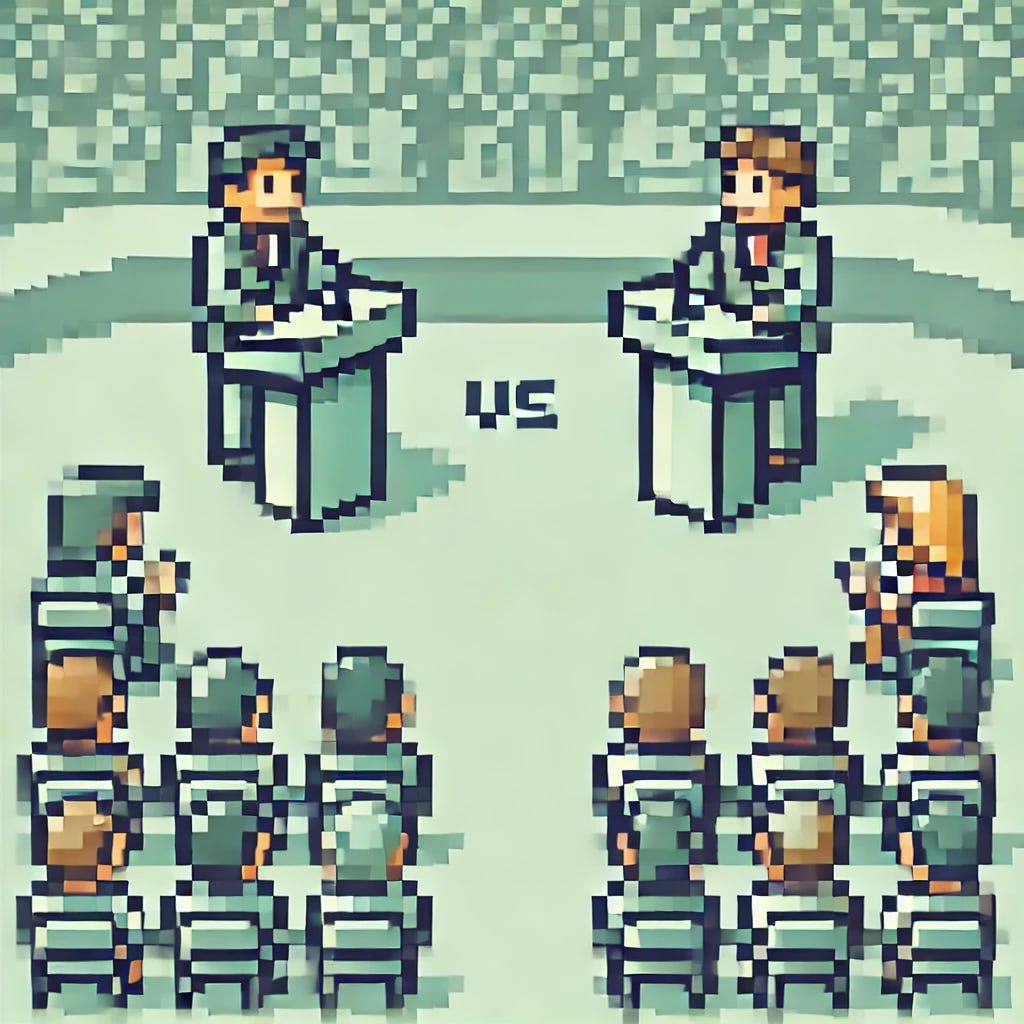Hello Gorgias! is a weekly newsletter devoted to writing, rhetoric, and long-form argument. If you’re enjoying my posts, consider becoming a subscriber.
In the third episode of Star Trek: Discovery, Captain Gabriel Lorca explains why he gets to be a spicy space cowboy who doesn’t play by the rules: “universal law is for lackeys. Context…is for kings.”
This is a very bad rule for living in a democracy. But it’s very sound advice for aspiring rhetoricians. In fact, it’s such good advice that it seems obvious. Of course rhetoric is contextual! How could anyone think otherwise?
But this is a relatively modern way of thinking about persuasion. For a long time, rhetoricians were primarily concerned with the qualities of the speaker, the message, and the audience. The Greek concept of kairos notwithstanding, rhetoric was conceived as linear — not ecological.
A lot of rhetoricians would probably argue the shift to this new way of thinking is linked to the rise of new materialism and affect theory, which both seem very popular in the field right now. But I would argue it actually started earlier, with a famous debate between the rhetoricians Lloyd Bitzer and Richard E. Vatz.
For Bitzer, rhetoric is always situational. It emerges in response to specific problems or needs. To clarify, Bitzer is not saying rhetoric needs to be evaluated according to its historical context. He’s making the much more nuanced argument that something can only be considered rhetorical according to its context, the same way an action can only be considered moral according to the circumstances.
For Vatz, the idea that any situation can be objectively described is a myth. When we describe a situation, we’re always making choices about what to include or ignore. This means some aspects of the situation are always more salient than others. In other words, situations aren’t something rhetors and audiences respond to; they’re something rhetors and audiences create through their own words and actions.
At the end of the day, this is a debate about rhetorical agency. Bitzer believes situations elicit a response from speakers, who try to respond in ways that “fit” their circumstances. In this model, speakers are always reacting to events in the world around them. Vatz, in contrast, argues speakers and audiences create and shape the situation they find themselves in. They’re acting, not reacting.
In today’s post, I want to explore this debate in more detail and explain how it illustrates some of the principles I discussed in my previous post on argumentation theory.
Next week, I’ll use the Bitzer-Vatz debate as a jumping-off point for a deeper investigation into advanced stasis theory, which will help us better understand what it means to think strategically about argumentation.
The Rhetorical Situation
In his seminal 1968 article, “The Rhetorical Situation,” Bitzer defines rhetoric as discourse that produces “action or change in the world.” Since it is a “mode of altering reality,” rhetoric is fundamentally different from other kinds of speech.
The rhetorical situation is the context in which communication occurs. It includes people, events, objects, and relationships. According to Bitzer, the rhetorical situation necessitates certain kinds of communication, which gain their meaning and rhetorical character by participating in this context.
In other words, the rhetorical situation is the set of circumstances that invites and prescribes discourse. Something like a natural disaster, for example, actually demands a discursive response in the form of evacuation orders, political speeches, media coverage, public service announcements, and texts to endangered family members.
Bitzer believes that when something like a natural disaster occurs, it calls these texts into existence and shapes the form they must take. According to Bitzer, situations seek a “fitting” response, the same way questions seek a correct answer. If the government reacted to a natural disaster by tweeting knock knock jokes, it would be considered inappropriate. Jokes aren’t a fitting response to a serious situation.
According to Bitzer, there are three main features of a rhetorical situation.
The exigence: an “imperfection marked by urgency; it is a defect, an obstacle, something waiting to be done, a thing which is other than it should be.” An exigence can be strong or weak, real or unreal, important or trivial, easy to fix or persistent, and new or old. But an exigence is only rhetorical if it can be modified through discourse.
The audience: a group of people capable of being influenced by discourse. They must be persuadable.
The constraints: limits either introduced and managed by the rhetorician (Aristotle would refer to these as “artistic proofs”) or imposed by the situation itself (“inartistic proofs”).
The important thing to recognize about Bitzer’s theory of the rhetorical situation is how much it emphasizes events themselves. Bitzer’s rhetors are always reacting to the situations they find themselves in — situations that invite discourse, but also establish expectations for that discourse. Speakers who deliberately or accidently ignore these expectations pay a price with their audience.
The obvious advantage of Bitzer’s rhetorical situation is a more holistic account of persuasion. There’s more room to examine things like kairos, for example. But there are a lot of disadvantages as well.
Vatz’s Rebuttal
Five years after Bitzer’s article, a rhetorician named Richard E. Vatz published “The Myth of the Rhetorical Situation,” which argues there is no such thing as an objective rhetorical situation.
I want to be very clear here: Vatz is not saying there is no such thing as objective reality. He’s not defending the kind of naive relativism that denies facts, eyewitness testimony, or empirical evidence.
Vatz is arguing that our relationship to objective reality is always mediated by discourse. When we use language to describe something, we’re always making decisions about what to include and what to leave out. This means rhetoric is not just a response to situations. It creates the situation by shaping how events are understood.
Bitzer claims the situation determines the correct response, but Vatz’s point is that you never run out of ways you could potentially describe something. When you choose some details and not others, you’re selecting parts of the situation and imbuing them with salience.
Salience refers to the rhetorical presence something has. It’s the level of significance or weight you give something by deciding to pay attention to it. If a politician makes a passing remark, some audiences might shrug it off, while others could see it as evidence of a secret conspiracy. There is an objective reality, but both audiences can only relate to that reality through their subjective interpretation of the remark. As a result, each audience would probably view the other’s response as inappropriate.
Burden of Proof/Burden of Rejoinder
In the debate between these two rhetoricians, Bitzer begins with the burden of proof. He coined the term “rhetorical situation,” he’s the one asserting it exists, so he’s responsible for supporting his position with facts and evidence.
Vatz is refuting Bitzer’s position, which means Vatz he has the burden of rejoinder. If he’s interested in having a productive disagreement, he has to maintain clash by directly responding to the Bitzer’s claims, warrants, or evidence.
There are a lot of ways Vatz could do this. He could deny the rhetorical situation exists, for example. This would be a defense of the status quo. Bitzer is suggesting a new way of thinking about rhetoric. Vatz would be saying we don’t need it. The side refuting or negating a claim almost always has the option of saying, “no, we prefer things the way they are.”
Vatz doesn’t take this route. Instead of denying Bitzer’s assertion, Vatz conceeds that the rhetorical situation exists, but argues that Bitzer is mischaracterizing it. This is the point of stasis in the debate: Bitzer and Vatz both agree that something called the rhetorical situation exists and that it merits discussion.
The difference is that Bitzer thinks the rhetorical situation is objective, arising from events themselves, while Vatz believes the rhetorical situation is established through the interactions of speakers and audiences.
Put differently, they both think context is for kings. But Vatz also thinks universal law is for lackeys. For Vatz, speakers have the ability to shape reality and determine what kind of response qualifies as 'fitting,' while Bitzer’s speakers are constrained by events.
Good luck with your writing!






